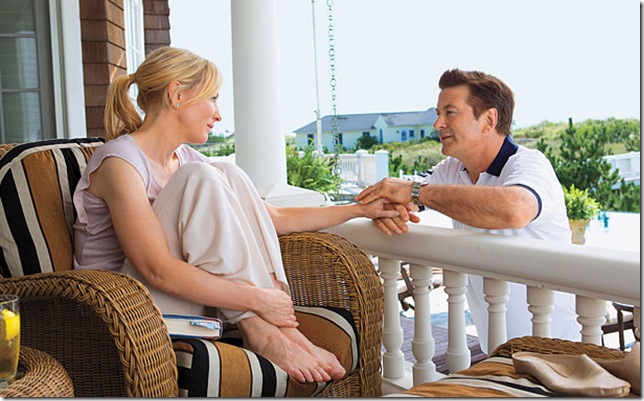Eschewing the surrealist whimsy and chic travel-porn of Midnight in Paris and To Rome With Love, Woody Allen is back on firmer and more unforgiving ground with Blue Jasmine, and it might just be one of his most affecting character studies.
If those last two features were like European vacations themselves – fantasies vastly removed from Americans’ real problems, where the only roadblock was the excess of intellectual windbaggery – then Blue Jasmine is a return to Earth. The allure of those exotic European locales is replaced here by the rat race of workaday San Francisco, where the lighting is a harsh fluorescence and the director’s close-ups capture tears, sweat, running mascara and plenty of psychic bruises.
Most of them adorn the surprisingly elastic visage of Cate Blanchett, whose marathon, Oscar-worthy performance runs the gamut from glamorous to homeless. In Allen’s cutting study of recessionary America, Blanchett’s is the face of this entire economic crisis: both co-conspirating perpetrator and downsized victim; coddled spouse and desperate sister.
We are introduced to Blanchett’s Jasmine as her plane lands in San Francisco, where she’s planning to emotionally convalesce with her somewhat estranged sister Ginger (Sally Hawkins) after the prison suicide of longtime husband Hal (Alec Baldwin), a pyramid-scheming swindler and adulterer. With a time-jumping structure, Allen peels away Jasmine’s back story like an onion, alternating between her blissfully ignorant past and the present she’s forced to accept: between her charmed life as a bankster’s trophy wife on Park Avenue to her obstinate second act in her sister’s San Fran tenement.
At first, Jasmine still acts like a 1-percenter on holiday, putting up the necessary appearances. She tells Ginger she’s had no money since her husband’s scandal destroyed their union, but she still flies first-class to California, and she could never part with her monogrammed Louis Vuitton luggage. Still living in the false memories of imagined affluence, she persistently asks questions that sound absurd to paycheck-to-paycheck laborers like her sister, such as “have you ever been abroad?” With no actual skills to her name, Jasmine wants a job, in theory, but not one in which she’ll have to, like … work.
The more Jasmine accepts her new reality, the more unhinged she becomes – surviving on alcohol and Xanax, detaching herself from reality, inventing more-successful personas. I can’t say enough about Blanchett’s dynamic performance as this self-deluded, pitiful creature. There’s a bit of the Gena Rowlands of A Woman Under the Influence in her character’s nervous breakdowns, which she sells with bracing authenticity, and she’s equally convincing as the perfectly manicured Wall Street wife.
As always, Allen has cast a stellar ensemble of supporting players to orbit around Jasmine. Hawkins is effortlessly charming as usual, and Bobby Cannavale is amusing, though never especially dangerous, as her grease-monkey boyfriend with a short fuse (Allen modeled this cohabitation dynamic off of A Streetcar Named Desire). Andrew Dice Clay is brought back from the dead as Ginger’s husband Augie in the flashback scenes, and he’s a surprisingly believable dramatic actor. Louis C.K., Peter Sarsgaard and Michael Stuhlberg turn up in smaller roles.
Blue Jasmine falters once or twice when Allen relies on the machine-of-god contrivances of lazier screenwriters. From a cab on a bustling Manhattan street, Ginger will spot Hal in an uncompromising position. Or Augie will materialize out of nowhere to provide a soliloquy of exposition at a crucial point later in the story. Because, you know, New York and San Francisco are such quaint small towns that it’s hard not to just bump into acquaintances all the time.
Otherwise, this is quite a return to form for Allen – the form being the sort of seriocomic confrontation of class and relationships he mastered in films like Hannah & Her Sisters and Husbands and Wives. And it’s all the better for acknowledging the wide chasms between the haves and have-nots in today’s economy. Even a lot of the really good Allen films tend to be insulated affairs – cinema in a rarefied bubble. But this one feels utterly of the moment, and it’s uncompromising in its conclusions.
BLUE JASMINE. Director: Woody Allen; Cast: Cate Blanchett, Sally Hawkins, Alec Baldwin, Bobby Cannavale, Peter Sarsgaard, Michael Stuhlberg, Louis C.K., Andrew Dice Clay; Distributor: Sony Pictures Classics; Rating: PG-13; Opens: Friday at area theaters.
